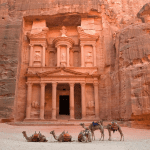Egypt is a land steeped in rich history, vibrant culture, and ancient traditions that continue to captivate travelers from around the world. As you embark on your journey to this mesmerizing destination, it is essential to be mindful of the customs and etiquette practices that shape the social interactions in Egyptian society. By understanding and respecting the local norms, you not only show appreciation for the country’s heritage but also enhance your travel experience by fostering positive connections with the people you meet along the way. In this guide, we will delve into essential etiquette tips for navigating the diverse facets of Egyptian culture, from dressing appropriately to communicating effectively and engaging respectfully with the local community.
Dress Code and Cultural Sensitivity
Appropriate Attire for Men and Women
When in Egypt, it’s essential to dress modestly, especially when visiting religious sites or conservative areas. For both men and women, it’s recommended to wear loose-fitting clothing that covers the shoulders, arms, and knees. Avoid wearing revealing outfits to show respect for the local culture.
Respecting Religious Clothing Guidelines
Respecting religious clothing guidelines is crucial in Egypt. When visiting mosques or Coptic churches, both men and women are required to remove their shoes before entering. Women should cover their hair with a scarf and avoid wearing tight or revealing clothing out of respect for the religious customs.
Greeting Customs and Social Etiquette
Traditional Greetings and Gestures
When greeting someone in Egypt, a common practice is to shake hands and exchange pleasantries. It’s polite to use honorific titles like “Mr.” or “Mrs.” followed by the person’s last name. In more conservative settings, it’s respectful for men and women to refrain from physical contact during greetings.
Showing Respect to Elders and Authorities
In Egyptian culture, showing respect to elders and authorities is highly valued. It’s customary to address older individuals with respect and deference. When interacting with figures of authority, such as police officers or government officials, maintain a polite and formal demeanor to show respect for their position.
Dining Etiquette and Food Customs
Table Manners and Eating Habits
When dining in Egypt, it’s common to eat with your right hand as the left hand is considered unclean. It’s polite to wait for the host or eldest person at the table to start eating before you begin. Remember to try a bit of everything served to show appreciation for the meal.
Understanding Local Cuisine and Culinary Traditions
Egyptian cuisine is rich in flavors and history. Traditional dishes like koshari, falafel, and ful medames are popular among locals and visitors alike. Embrace the culinary traditions by trying local specialties and respecting the cultural significance of certain foods, such as dates during Ramadan.
Communication Tips and Language Considerations
Common Arabic Phrases for Travelers
Learning a few basic Arabic phrases can enhance your travel experience in Egypt. Phrases like “Salaam alaikum” (peace be upon you) for greetings and “Shukran” (thank you) are appreciated by locals. Even attempting simple phrases in Arabic shows respect for the language and culture.
Non-verbal Communication and Body Language Cues
Non-verbal communication plays a significant role in Egyptian culture. Maintain eye contact during conversations to show attentiveness and respect. Be mindful of your body language, as certain gestures may have different meanings in Egypt. When in doubt, observe and follow the cues of those around you.
Bargaining and Tipping Guidelines
Negotiating Prices in Markets and Souks
When it comes to bargaining in markets and souks in Egypt, think of it as a friendly game rather than a heated debate. Start with a smile and be prepared to negotiate – it’s all part of the fun. Remember, it’s customary to haggle for a lower price, but do so respectfully and with a sense of humor. Good-natured banter can go a long way in getting a good deal.
Appropriate Tipping Practices for Different Services
Tipping is a common practice in Egypt, and it’s essential to show appreciation for good service. In restaurants, a tip of around 10% is customary. For tour guides, drivers, and hotel staff, tipping a little extra is always appreciated. Remember, tipping is a way to show gratitude, so tip according to the level of service you receive.
Respect for Religious Sites and Traditions
Guidelines for Visiting Mosques and Temples
When visiting mosques and temples in Egypt, dress modestly out of respect for the religious sites. Women should cover their shoulders, arms, and legs, while men should avoid wearing shorts. Remember to remove your shoes before entering, and always ask permission before taking photos. Silence and reverence are key when inside these sacred spaces.
Understanding Islamic Customs and Practices
Islamic customs play a significant role in Egyptian culture. During Ramadan, the holy month of fasting, it’s polite to refrain from eating, drinking, or smoking in public during daylight hours. If invited to an Egyptian home, consider bringing a small gift as a gesture of goodwill. Showing respect for Islamic traditions will be appreciated by locals.
Transportation Etiquette and Safety Tips
Using Public Transportation with Respect
When using public transportation in Egypt, be mindful of personal space and respect the cultural norms around gender segregation. Avoid public displays of affection, as these can be considered inappropriate. Be prepared for crowded buses and trains, and keep your belongings secure at all times to prevent theft.
Ensuring Personal Safety While Traveling in Egypt
While Egypt is generally a safe destination for tourists, it’s essential to take precautions to ensure your personal safety. Avoid traveling alone at night, especially in unfamiliar areas. Stay aware of your surroundings and be cautious of scams targeting tourists. By staying vigilant and using common sense, you can enjoy your trip to Egypt with peace of mind.
Closing Thoughts
As you immerse yourself in the wonders of Egypt, remember that embracing the country’s etiquette norms is not just about following rules but about showing genuine respect for its people and traditions. By incorporating the tips and insights shared in this guide into your travel approach, you can navigate social interactions with grace and sensitivity, fostering meaningful connections and leaving a positive impact wherever your adventures take you in this remarkable land of pharaohs and pyramids. Safe travels and may your experiences in Egypt be filled with warmth, hospitality, and cultural enrichment.







Your ability to draw connections between seemingly unrelated ideas is nothing short of remarkable. Every sentence feels like it’s part of a larger whole, and the more I read, the more I realize how carefully each word has been chosen. There’s a depth here that is truly rare.